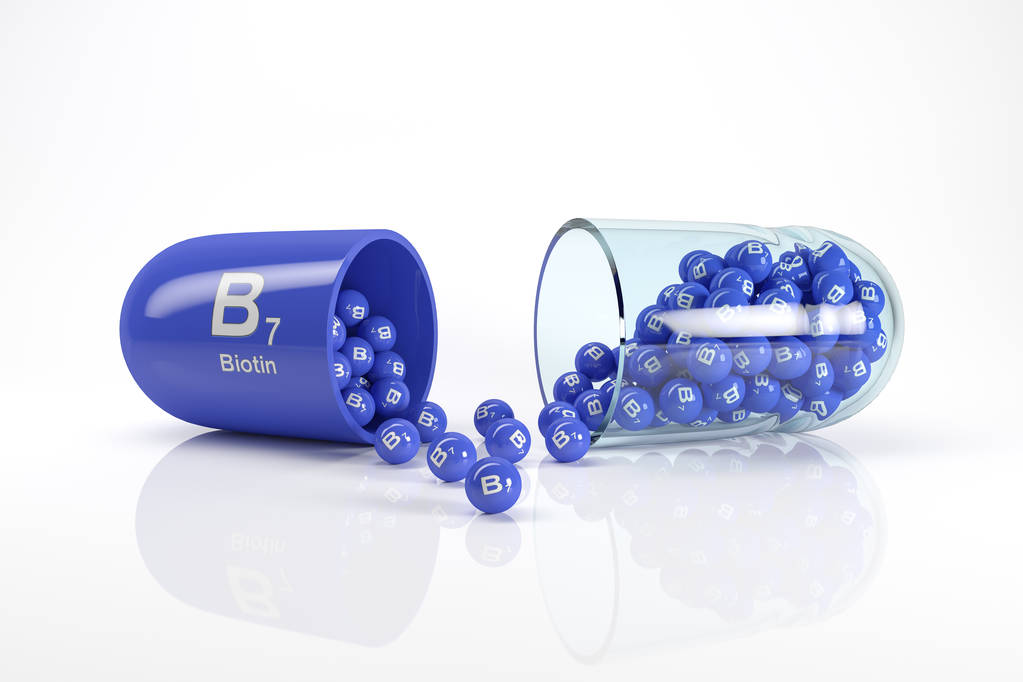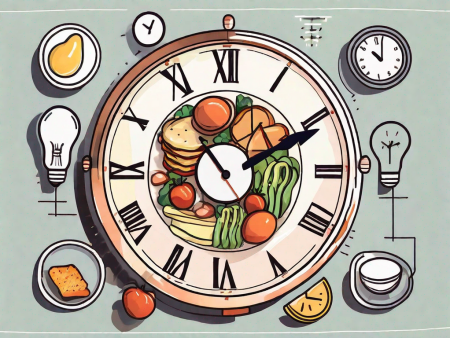Discover the fascinating connection between biotin and metabolism.
How Does Biotin Impact Metabolism?
Biotin, also known as vitamin B7, is a water-soluble vitamin that plays a crucial role in various metabolic processes within the body. From energy production to fat and protein metabolism, it acts as a powerful coenzyme that ensures our body functions optimally. In this article, we will explore the fascinating connection between biotin and metabolism, the benefits it offers for overall health, and some important considerations when it comes to supplementation.

Understanding Biotin: A Brief Overview
To comprehend how biotin impacts metabolism, let’s first get to know this remarkable vitamin a little better. Biotin belongs to the B-complex vitamin family and is found naturally in many common foods such as eggs, nuts, and whole grains. It is responsible for converting our food into energy by helping enzymes break down carbohydrates, fats, and proteins. This energy is what fuels our everyday activities, making biotin an unsung hero lurking in our breakfast omelets and snack time almonds.
Did you know that biotin, also known as vitamin B7, was first discovered in 1916 by the Hungarian biochemist Paul Gyorgy? Since then, researchers have been fascinated by its role in our body’s metabolism and overall health. Let’s dive deeper into the fascinating world of biotin and explore its various functions.
The Role of Biotin in the Body
So, what does biotin actually do in our bodies? Well, this mighty little vitamin is involved in some vital metabolic reactions. It acts as a cofactor for various enzymes, assisting them in carrying out their metabolic duties more efficiently. On a cellular level, biotin helps convert glucose into usable energy, ensuring our body has the fuel it needs to keep us going throughout the day.
Furthermore, biotin is not only involved in energy production but also plays a crucial role in maintaining healthy hair, skin, and nails. It supports the production of keratin, a protein that is essential for the strength and structure of our hair and nails. Biotin deficiency can lead to brittle nails, hair loss, and skin issues, highlighting the importance of this vitamin in our beauty regimen.
Moreover, biotin plays a key role in the synthesis of fatty acids. It helps break down these essential building blocks, allowing our body to utilize them for energy production or the formation of other necessary molecules. Biotin’s involvement in amino acid metabolism, on the other hand, helps ensure proper protein synthesis, making it an integral part of our overall growth and development.
Interestingly, recent studies have also suggested that biotin may have a positive impact on cognitive function. While further research is needed to fully understand the extent of its effects, it’s intriguing to think that this vitamin may not only support our physical health but also our mental well-being.
Sources of Biotin: Natural and Supplements
Fortunately, biotin is readily available from both natural food sources and supplements. Foods such as eggs, Swiss chard, and almonds are brimming with biotin goodness, making it easy to incorporate into our diet. Including a variety of these biotin-rich foods in our meals can help ensure we meet our daily requirements.
But what if you’re looking to supplement your biotin intake? Biotin supplements are also available over the counter, offering a convenient option for those who may have specific dietary restrictions or need an extra boost. However, it’s important to note that while biotin supplementation can be helpful for those with deficiencies or specific health conditions, it’s always best to consult with a healthcare professional before starting any new regimen. They’ll be able to guide you on the appropriate dosage and provide tailored advice based on your individual needs.
In conclusion, biotin is a remarkable vitamin that plays a crucial role in our body’s metabolism and overall well-being. From converting food into energy to supporting the health of our hair, skin, and nails, biotin is truly an unsung hero. So, the next time you enjoy a delicious omelet or snack on some almonds, remember that you’re not only satisfying your taste buds but also fueling your body with the power of biotin.
The Connection Between Biotin and Metabolism
Now that we have a solid foundation of knowledge about biotin, let’s dive deeper into its connection to metabolism. Remember, our body’s metabolic processes are the fascinating behind-the-scenes operations that keep everything functioning like a well-oiled machine.
Metabolism is the set of chemical reactions that occur in living organisms to maintain life. It involves the conversion of food into energy, the building and repair of tissues, and the elimination of waste products. Biotin, also known as vitamin B7, plays a crucial role in several aspects of metabolism, making it an essential nutrient for our bodies.
Biotin in Energy Metabolism
When it comes to energy metabolism, biotin is a superhero. It helps enzymes, such as pyruvate carboxylase, effectively convert carbohydrates from our meals into glucose. This glucose is then broken down through a complex series of reactions, ultimately generating usable energy for our bodies.
Think of it as biotin giving the green light to these enzymes, allowing them to work their magic and ensuring that we have energy in our tank to conquer whatever the day throws at us.
Furthermore, biotin is involved in the metabolism of fats and proteins, which are alternative sources of energy when carbohydrates are not readily available.
Biotin’s Role in Fat and Protein Metabolism
Biotin’s impact on metabolism extends to the realms of fats and proteins as well. When it comes to fat metabolism, biotin helps certain enzymes break down fatty acids into smaller molecules, which can then be used to generate additional energy.
On the protein front, biotin is essential for the metabolism of amino acids. It aids in the breakdown of these building blocks, enabling the synthesis of necessary proteins and playing a fundamental role in muscle growth and maintenance.
Without biotin, our bodies would struggle to efficiently utilize the nutrients we consume, leading to potential energy deficiencies and impaired metabolic functions.
It’s worth noting that biotin is not only involved in energy metabolism but also plays a role in other vital processes, such as gene expression, cell signaling, and the production of certain hormones.
Now that we have explored the connection between biotin and metabolism, it is evident that this humble vitamin is a true multitasker, ensuring that our bodies can effectively convert food into energy, build and repair tissues, and maintain overall health and well-being.
The Impact of Biotin Deficiency on Metabolism
Lacking sufficient biotin in our diet can have some not-so-pleasant consequences on our metabolic processes. Let’s explore the repercussions of biotin deficiency, so we understand why it’s important to ensure our bodies have an ample supply of this essential vitamin.
Biotin, also known as vitamin B7, is a water-soluble vitamin that plays a crucial role in various metabolic processes. It acts as a coenzyme, assisting in the breakdown of macronutrients such as carbohydrates, fats, and proteins, and converting them into usable energy for our body.
However, when our body lacks sufficient biotin, it can’t efficiently break down these macronutrients into energy. This can result in a sluggish metabolism, leading to decreased energy levels and difficulty maintaining a healthy weight.
Symptoms of Biotin Deficiency
Biotin deficiency can manifest itself in various ways, and the symptoms can range from mild to severe. Some early signs to be aware of include thinning hair, brittle nails, and dry skin. These symptoms occur because biotin plays a vital role in maintaining the health of our hair, nails, and skin.
Individuals with insufficient biotin levels may also experience fatigue and muscle pain. Biotin is involved in the production of energy, and without enough of it, our body may struggle to generate sufficient energy, leading to feelings of tiredness and muscle discomfort.
In severe cases, biotin deficiency can lead to neurological symptoms such as depression, hallucinations, or even seizures. Though these circumstances are rare, they highlight the importance of maintaining adequate biotin levels to keep our metabolic processes in check.
How Biotin Deficiency Affects Metabolic Processes
In addition to the symptoms mentioned above, biotin deficiency can hinder the synthesis of important molecules, including fatty acids and proteins. Biotin is involved in the production of fatty acids, which are essential for various bodily functions, including the formation of cell membranes and the absorption of fat-soluble vitamins.
Furthermore, biotin is necessary for the proper metabolism of amino acids, the building blocks of proteins. Without enough biotin, our body’s ability to utilize these macronutrients is compromised, impacting essential bodily functions such as muscle growth, tissue repair, and hormone production.
Moreover, biotin deficiency can disrupt the balance of gut bacteria, which play a crucial role in digestion and nutrient absorption. This imbalance can further contribute to metabolic dysfunction and nutrient deficiencies.
It is worth noting that biotin deficiency is relatively rare, as the vitamin is found in a variety of foods such as eggs, nuts, seeds, and certain vegetables. However, certain factors can increase the risk of deficiency, including pregnancy, certain medications, and certain genetic disorders that affect biotin metabolism.
To ensure optimal metabolic function, it is essential to consume a balanced diet that includes biotin-rich foods or consider biotin supplements if necessary. By maintaining adequate biotin levels, we can support our body’s metabolic processes and overall health.
The Benefits of Biotin for Metabolic Health
Now that we recognize the critical role biotin plays in metabolism, let’s uncover the benefits it offers for our overall metabolic health.
Biotin and Weight Management
As we’ve learned, biotin supports the breakdown of macronutrients into usable energy. By assisting with this process, it can aid in weight management efforts. When our metabolism is functioning optimally, it helps regulate our energy expenditure, making it easier to maintain a healthy weight or shed a few extra pounds if desired.
Remember, though, that while biotin can be a helpful tool, it’s not a magical cure-all for weight loss. It’s important to combine biotin with a balanced diet and regular exercise for best results.
Biotin’s Impact on Blood Sugar Levels
Steady blood sugar levels are crucial for overall health, and biotin plays a part in maintaining this delicate balance. It aids in the breakdown and utilization of carbohydrates, ensuring glucose is appropriately processed and released into the bloodstream.
By helping our body effectively manage blood sugar levels, biotin can assist in preventing spikes and crashes, promoting sustained energy levels throughout the day.
Potential Risks and Considerations of Biotin Supplementation
While biotin supplementation can be beneficial, it’s essential to approach it with caution and be aware of potential risks or interactions.

Side Effects of Excessive Biotin Intake
Although incredibly rare, excessive biotin intake can lead to certain side effects. In some cases, individuals have reported skin rashes, digestive issues, or even interference with laboratory test results.
It’s vital to follow the recommended dosage guidelines and consult with a healthcare professional to ensure you’re taking an appropriate amount for your specific needs.
Interactions of Biotin with Other Nutrients and Medications
Lastly, certain medications or interactions with other nutrients can affect biotin absorption or metabolism. For example, long-term antibiotic use or anticonvulsant medications may interfere with biotin levels in the body.
If you’re taking any medications or have concerns about potential interactions, it’s always wise to consult with your healthcare provider to ensure optimal supplementation practices.
The Bottom Line
Biotin’s impact on metabolism is truly remarkable. This small-but-mighty vitamin ensures our body’s metabolic processes run smoothly, optimizing energy production, fat breakdown, and protein synthesis. By understanding the essential role biotin plays, we can appreciate its benefits for weight management and blood sugar regulation.
So, whether you’re munching on a handful of almonds or exploring biotin supplementation under professional guidance, remember that this unsung hero is your metabolic ally, working behind the scenes to keep your body operating at its best.
Stay biotin-tastic!







